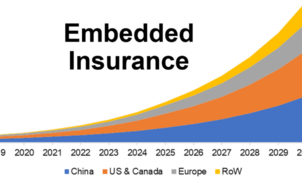
Global insurance isn’t just about safeguarding assets; it’s about how we face a world with diverse risks. To comprehend and overcome these challenges, let’s explore how global insurance can help us cope with complex and varied risk situations that we might encounter.
I. Understanding the Essence of Global Risks
1. Diversity of Risks in Insurance
Risk, in the context of insurance, encompasses a wide spectrum of potential threats that individuals, businesses, or societies face. Understanding the diversity of these risks is crucial in formulating comprehensive insurance coverage to mitigate their impact. Here’s an overview of the diverse range of risks:
Financial Risks
Market Volatility
Financial markets are prone to fluctuations due to various factors like economic conditions, geopolitical events, or market sentiment. These fluctuations can affect investments, stocks, and other financial instruments.
Economic Downturns
Global economic downturns, recessions, or financial crises can have far-reaching implications, leading to job losses, business closures, reduced consumer spending, and financial instability on a large scale.
Currency Fluctuations
Currency values fluctuate due to economic changes, political events, or international trade. Such fluctuations can affect businesses engaged in global trade and foreign investments.
Property and Asset Risks
Natural Disasters
Natural calamities like earthquakes, hurricanes, floods, wildfires, or tsunamis pose a significant threat to properties, causing damage or destruction.
Fire and Accidental Damages
Fire outbreaks, accidents, or unforeseen events can lead to property damage or loss, impacting individuals or businesses financially.
Liability Risks
Legal Liabilities
Legal liabilities arising from lawsuits, negligence claims, or accidents can have substantial financial repercussions for individuals or organizations, necessitating liability coverage.
Professional Liability
Professionals in various fields face risks associated with errors, omissions, or malpractice claims, requiring specialized insurance coverage to mitigate these risks.
Health and Life Risks
Health-related Risks
Health-related risks encompass medical emergencies, illnesses, pandemics, or unexpected healthcare expenses, emphasizing the need for health insurance coverage.
Life Risks
The risk of premature death or unforeseen circumstances impacting an individual’s life or their dependents underscores the importance of life insurance.
Environmental and Climate Risks
Climate Change
Environmental risks such as climate change, pollution, or ecological damage can lead to long-term consequences, affecting industries, communities, and insurance requirements.
Sustainability Risks
Issues related to sustainable practices, environmental regulations, or corporate responsibility pose risks that businesses need to address to ensure long-term viability.
Understanding the diverse nature of risks allows insurers to tailor comprehensive insurance policies to meet the specific needs of individuals, businesses, or communities. It underscores the importance of having insurance coverage that adequately addresses these varied risks to provide financial protection and security in uncertain times.

2. Global Insurance and its Operations
Global insurance plays a pivotal role in protecting individuals, businesses, and economies from various risks across international borders. Understanding how it operates on a global scale is crucial to grasp its significance in mitigating diverse risks. Let’s explore the core aspects of global insurance operations:
Scope of Coverage
International Reach
Global insurance extends coverage across borders, ensuring protection for individuals, businesses, and assets in different countries. It navigates regulatory and legal frameworks to provide comprehensive coverage.
Multifaceted Risks
Insurance on a global scale caters to a wide range of risks, including financial, property, liability, health, environmental, and geopolitical risks, necessitating versatile coverage solutions.
Operational Mechanisms
Risk Assessment
Global insurers conduct extensive risk assessments, employing actuarial sciences, data analytics, and predictive modeling to evaluate and price risks accurately.
Underwriting Standards
Underwriting involves setting terms, conditions, and pricing for insurance policies, accounting for diverse risks while ensuring profitability and sustainability.
Insurance Products
Tailored Offerings
Global insurers offer diverse products tailored to meet specific risks prevalent in different industries, regions, or markets, including property, casualty, life, health, and specialty insurance.
Reinsurance
Reinsurance serves as a vital component, enabling insurers to spread risks and manage their exposure by transferring portions of risk to other insurers or reinsurers.
Regulatory Compliance
Compliance Challenges
Operating on a global scale involves navigating diverse regulatory environments, compliance requirements, and legal frameworks, necessitating comprehensive risk management and legal compliance.
Cross-Border Regulations
Adherence to international laws, treaties, and agreements is crucial, ensuring insurers comply with regulations governing their operations in multiple countries.
Technology and Innovation
Digital Transformation
Advancements in technology drive digital transformation in the insurance industry, facilitating automation, online platforms, and digital services for better customer experience and operational efficiency.
Innovation in Risk Management
Integration of innovative technologies such as AI, IoT, and big data analytics revolutionizes risk assessment, claims processing, and fraud detection.
Global insurance operations encompass a multifaceted landscape, addressing diverse risks and challenges on an international scale. Understanding its mechanisms, compliance requirements, and technological advancements is vital for insurers to navigate this complex landscape and provide effective risk mitigation solutions.

II. Confronting Challenges and Coping Strategies
1. Flexibility and Diversification
The essence of global insurance lies in its ability to adapt and diversify in response to the ever-evolving risks across diverse regions and industries. Understanding the significance of flexibility and diversification in the insurance landscape is crucial to addressing multifaceted challenges. Let’s delve into these aspects:
Flexibility in Insurance Offerings
Tailoring Coverage
Global insurers exhibit flexibility by tailoring insurance coverage to suit varying needs, whether for individuals, businesses, or specialized industries. They offer customizable policies adaptable to different risk profiles.
Agile Underwriting
Flexibility in underwriting standards allows insurers to assess risks swiftly, make adjustments to policy terms, and respond promptly to changing market conditions or emerging risks.
Adapting to Diverse Risks
Multinational Risk Landscape
Global insurers embrace diverse risks prevalent in different regions, such as geopolitical risks, natural disasters, regulatory changes, or economic fluctuations, and offer insurance solutions catering to these challenges.
Industry-Specific Coverage
Flexibility extends to offering specialized insurance products for industries with unique risks, like marine, aviation, technology, or cyber insurance, tailoring coverage to meet specific industry needs.
Operational Agility
Efficient Claims Processing
An agile approach in claims processing ensures quick and fair settlements, employing technology and streamlined procedures to handle claims across various jurisdictions.
Responsive Customer Service
Insurers demonstrate flexibility by providing responsive customer service, offering support, and adapting to clients’ evolving needs, enhancing customer satisfaction and loyalty.
Reinsurance and Risk Transfer
Reinsurance Solutions
Utilizing reinsurance allows insurers to diversify risks, spreading their exposure across various reinsurers globally, reducing concentration risks, and ensuring financial stability.
Risk Pooling and Syndication
Participation in risk pooling or syndication arrangements enables insurers to share risks with other market participants, enhancing risk diversification and resilience.

Innovation and Technological Adaptation
Embracing Technological Advancements
Global insurers invest in innovative technologies, embracing automation, artificial intelligence, and data analytics to enhance operational efficiency and risk assessment.
Adaptation to Market Dynamics
The ability to swiftly adapt to market changes, regulatory requirements, and emerging technologies showcases the insurance industry’s flexibility in embracing innovation.
Flexibility and diversification are the cornerstones of global insurance, enabling insurers to adapt, innovate, and cater to diverse risks prevalent in a dynamic environment. This adaptability not only ensures comprehensive coverage for clients but also drives innovation and resilience within the insurance industry.
2. Innovation and Technology
In the realm of global insurance, innovation and technology serve as catalysts for transformation, reshaping operational paradigms, and redefining risk management strategies. Understanding the impact of innovation and technology in the insurance landscape is pivotal in navigating the complexities of modern risks. Let’s delve deeper into these facets:
Technological Advancements
Data Analytics
The utilization of advanced data analytics tools enables insurers to gather, analyze, and derive insights from vast amounts of data, facilitating informed decision-making and risk assessment.
Artificial Intelligence (AI)
AI-powered systems enhance underwriting processes, claims handling, and risk modeling, leveraging machine learning algorithms to improve accuracy and efficiency.
Digitalization in Operations
Online Platforms
Insurance companies embrace digitalization by offering online platforms for policy purchases, claims filing, and customer service, enhancing accessibility and convenience for clients.
Automation
Automation streamlines operational processes, including policy issuance, premium calculations, and document management, reducing manual errors and improving efficiency.
Insurtech Innovations
Mobile Applications
Mobile apps facilitate easy policy management, claims tracking, and customer engagement, providing users with real-time access to insurance services.
Telematics and IoT
Integration of telematics and IoT devices enables insurers to offer usage-based insurance, monitor risks, and personalize premiums based on behavior analysis.
Blockchain Technology
Secure Transactions
Blockchain technology ensures secure and transparent transactions, reducing fraud risks and enhancing trust in insurance contracts and claim settlements.
Smart Contracts
The use of smart contracts automates claim settlements, eliminating intermediaries, reducing processing time, and ensuring accuracy in transactions.
Cybersecurity Measures
Data Protection
Robust cybersecurity measures safeguard sensitive customer data, preventing cyber threats and ensuring compliance with data protection regulations.
Risk Mitigation
Investments in cybersecurity protocols and threat detection systems mitigate cyber risks, protecting insurers and policyholders from potential cyberattacks.
Integration of Insurtech Startups
Collaboration and Partnerships
Insurers collaborate with insurtech startups, fostering innovation, and adapting to emerging technologies through partnerships and joint ventures.
Digital Transformation
Embracing the expertise of insurtech startups facilitates the digital transformation of traditional insurance processes, improving agility and competitiveness.
Innovation and technology revolutionize the global insurance landscape, fostering agility, efficiency, and improved customer experiences. Embracing these advancements is crucial for insurers to stay competitive, enhance risk management capabilities, and meet evolving customer demands in an ever-changing digital era.
Global insurance stands as a cornerstone of financial stability and security, playing a crucial role in safeguarding individuals, businesses, and economies against diverse risks on an international scale. Understanding the importance of global insurance is pivotal in recognizing its profound impact and the essential role it plays in our interconnected world. Let’s explore its significance in detail:
Financial Protection and Stability
Risk Mitigation
Global insurance mitigates financial risks by providing coverage against unforeseen events, protecting assets, and ensuring financial stability for policyholders.
Economic Resilience
Insurance coverage aids in economic resilience by facilitating recovery post-disaster, reducing the financial impact on individuals, businesses, and communities.
Societal Contribution
Social Stability
Insurance contributes to social stability by alleviating the financial burdens of unexpected events, enabling individuals and communities to recover and rebuild.
Sustainable Development
Supporting sustainable development initiatives, insurance fosters resilience against risks, promoting long-term economic and social growth.
Personal and Business Security
Personal Financial Security
For individuals, insurance offers peace of mind, ensuring protection against potential financial hardships due to accidents, illnesses, or unforeseen circumstances.
Business Continuity
For businesses, insurance safeguards against operational disruptions, providing financial support and risk management solutions in times of crisis.

Global Risk Management
Risk Transfer Mechanism
Global insurance serves as a risk transfer mechanism, distributing risks across a wide spectrum, ensuring resilience against systemic risks.
Cross-border Operations
Operating on a global scale, insurers facilitate international trade and investments, reducing uncertainties and risks associated with cross-border transactions.
Regulatory Compliance and Stability
Compliance Requirements
Insurance companies adhere to stringent regulatory frameworks, ensuring stability, consumer protection, and compliance with legal and ethical standards.
Financial Stability
By providing financial stability and managing risks, insurance contributes to the stability of financial markets and economies globally.
Global insurance stands as a vital pillar of financial security and stability, contributing significantly to individuals, businesses, and society as a whole. Its role in managing risks, ensuring resilience, and fostering economic and social stability cannot be overstated in our interconnected and unpredictable world.
III. Conclusion
Global insurance doesn’t just protect individuals and assets; it’s a vital tool for facing a world filled with diverse risks. By understanding and implementing these principles, we can create a safer and more stable environment on a global scale.







 Welcome to LawyerNote, your premier destination for expert legal counsel tailored to your unique needs. At LawyerNote, we specialize in navigating the complexities of the legal system, offering comprehensive solutions to our valued clients. With a team of seasoned attorneys covering diverse fields including corporate law, family law, and criminal defense, we’re equipped to handle a wide spectrum of legal matters. Our unwavering commitment to excellence, integrity, and client satisfaction sets LawyerNote apart. Whether you’re grappling with a complex litigation case or seeking guidance on business transactions, LawyerNote is your trusted legal partner every step of the way.
Welcome to LawyerNote, your premier destination for expert legal counsel tailored to your unique needs. At LawyerNote, we specialize in navigating the complexities of the legal system, offering comprehensive solutions to our valued clients. With a team of seasoned attorneys covering diverse fields including corporate law, family law, and criminal defense, we’re equipped to handle a wide spectrum of legal matters. Our unwavering commitment to excellence, integrity, and client satisfaction sets LawyerNote apart. Whether you’re grappling with a complex litigation case or seeking guidance on business transactions, LawyerNote is your trusted legal partner every step of the way.




